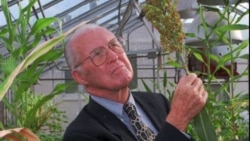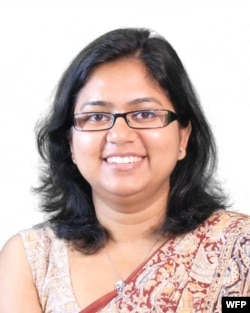Agronomist Dr. Norman Borlaug is widely recognized as the "father of the Green Revolution," a series of research, development, and technology transfer initiatives that are credited with more than doubling rice and cereal production in Asia between 1970 and 1995, potentially averting famine for as many as one billion people.
One of Norman Borlaug’s lasting contributions was the creation of the World Food Prize, which he established in 1986. This international award recognizes the achievements of individuals who have advanced human development by improving the quality, quantity or availability of food in the world.
A number of awards and foundations have been named in his honor, including two U.S. government programs: the Norman E. Borlaug International Agricultural Science and Technology Fellowship Program and the Norman Borlaug Commemorative Research Initiative.
This year, the Rockefeller Foundation launched the Norman Borlaug Award for Field Research and Application, to be presented every October by the World Food Prize Foundation. The award will recognize a young extension worker, research scientist, development professional or other individual who best emulates the dedication, perseverance and innovation demonstrated by Dr. Borlaug. The first recipient of the new award is Aditi Mukherji, whose research on groundwater resources in agriculture led to major policy changes in India.
Dr. Mukherji found that small farmers in West Bengal were prevented from obtaining enough water to irrigate their fields because they were subject to rules based on policies developed in water-poor areas. She convinced government officials to change the rules in this water-abundant region to reflect the true availability of water and allow the farmers to use ground water for growing a second and third crop after the surface water dries.
“We are honored to administer this new award, which so perfectly reflects Dr. Borlaug’s belief in the critical importance of training the next generation innovators,” said Ambassador Kenneth Quinn, president of the World Food Prize Foundation.
“Dr. Mukherji has demonstrated qualities that emulate Dr. Borlaug’s ingenuity and perseverance in transferring his scientific breakthrough to farmers and hungry people around the world through the gateway of government policy and action. Like Dr. Borlaug, she has shown persistence, innovation, effective communication, contribution to science, and application of that science for policy change to improve lives and livelihoods.”
One of Norman Borlaug’s lasting contributions was the creation of the World Food Prize, which he established in 1986. This international award recognizes the achievements of individuals who have advanced human development by improving the quality, quantity or availability of food in the world.
A number of awards and foundations have been named in his honor, including two U.S. government programs: the Norman E. Borlaug International Agricultural Science and Technology Fellowship Program and the Norman Borlaug Commemorative Research Initiative.
This year, the Rockefeller Foundation launched the Norman Borlaug Award for Field Research and Application, to be presented every October by the World Food Prize Foundation. The award will recognize a young extension worker, research scientist, development professional or other individual who best emulates the dedication, perseverance and innovation demonstrated by Dr. Borlaug. The first recipient of the new award is Aditi Mukherji, whose research on groundwater resources in agriculture led to major policy changes in India.
Dr. Mukherji found that small farmers in West Bengal were prevented from obtaining enough water to irrigate their fields because they were subject to rules based on policies developed in water-poor areas. She convinced government officials to change the rules in this water-abundant region to reflect the true availability of water and allow the farmers to use ground water for growing a second and third crop after the surface water dries.
“We are honored to administer this new award, which so perfectly reflects Dr. Borlaug’s belief in the critical importance of training the next generation innovators,” said Ambassador Kenneth Quinn, president of the World Food Prize Foundation.
“Dr. Mukherji has demonstrated qualities that emulate Dr. Borlaug’s ingenuity and perseverance in transferring his scientific breakthrough to farmers and hungry people around the world through the gateway of government policy and action. Like Dr. Borlaug, she has shown persistence, innovation, effective communication, contribution to science, and application of that science for policy change to improve lives and livelihoods.”







